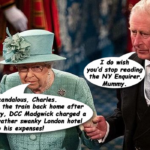Financial Control in NYP pt.1
by TIM HICKS
~~~~~
Introduction
UK Police Forces now publish Chief Officers’ expenses, to ensure openness and transparency, and to facilitate public and media scrutiny.
This article is the first of two articles covering standards of financial control over Police funds from 2005 to the present day.
It is part of a series of articles on Chief Police Officers expenses and the various financial issues that have caused public concern in North Yorkshire Police (NYP) since 2006 to the present day. They are in the public interest, being intended to improve financial control and accountability over the use of police funds.
They lead up to an article that will try to assess the total cost of these issues to the North Yorkshire Taxpayer since that date.
Background: Ms Joanna Carter
Ms Carter was appointed as NYP’s Chief Financial Officer (CFO) following the resignation of Finance Director Mr Paul Adams on the 8th of February 2005, after auditors revealed “significant weaknesses” in the North Yorkshire Police Authority’s financial management and accounting procedures.
At the time North Yorkshire MP Phil Willis, the Liberal Democrat MP for Harrogate and Knaresborough, said Director of Finance Paul Adams had been made a “scapegoat” following a damning auditor’s report and Police Authority Chairwoman County Councillor Jane Kenyon (known to NYE readers as “Miss X” from her role in the Poulson scandal) should now quit her job. He said:
“I’m sure that this particular officer has been made a scapegoat for the systemic failures within North Yorkshire Police Authority. It’s more than just about finding a convenient scapegoat, it’s about asking what’s wrong with the finances within North Yorkshire Police.”
The North Yorkshire Police Authority was the predecessor body prior to the creation of the current Police, Fire & Crime Commissioner for North Yorkshire.
In May 2013, Ms Carter was promoted to Chief Executive Officer to the Police & Crime Commissioner for North Yorkshire before going on long-term sick leave on the 29th of February 2016. She retired on the grounds of ill-health on the 28th of February 2018.
Ms Carter is pictured above at the former NYP Force Headquarters at Newby Wiske Hall with the disgraced former Chief Constable Grahame Maxwell. (Chief Constable Maxwell’s contract was not renewed in May 2012 after he admitted gross misconduct over allegations of nepotism).
During Ms Carter’s term as NYP CFO from 2006 to 2013 NYP was mired with controversy and failures in financial control:
- In 2006 Chief Constable Della Canning had a shower installed in her office which cost £28,400.
- In 2008 NYP Superintendent Ackerley who was in charge of NYP training and whose wife Peta’s training company received £400,000 in payments for training which was often obtained “without going through proper procurement procedures’.
- Chief Constable Grahame Maxwell and Deputy Chief Constable (DCC) Adam Briggs received thousands of pounds for personal developmenttraining and healthcare, but were not required to account for how they spent the money, or provide invoices to support the payments. Effectively making these payments unauditable.
- It is clear that these payments were not in fact expenses, but effectively salary payments made gross i.e. untaxed, which is illegal. They should be declared on the tax returns (Form P11D) made by the Police to HMRC, the same as everyone else.
- The payments to Chief Constable Maxwell and DCC Briggs were described in the accounts as allowances for ‘personal development and healthcare’, when in fact no one knows what the money was spent on. Which is false accounting.
- The Chief Constable’s PA authorised payments to DCC Briggs that should not have been made, when she was not in fact an authorised signatory.
- DCC Tim Madgwick had the costs of his private leisure activity of being a board member for a charity – which had nothing to do with policing in North Yorkshire – paid for by NYP.
- The payments to DCC Madgwick for his private charity work were not separately disclosed in the accounts.
- Chief Constable Maxwell submitted expenses for attending the Edinburgh Tattoo.
- NYP Chief Officers were allowed to book travel and accommodation without prior authorisation.
- Incredibly, the Chief Executive of the Police Authority Mr Jeremy Holderness commented on the so called “development and healthcare allowances”:
“Such allowances are not unfamiliar in policing, or indeed many other avenues of business, and they are seen to be quite reasonable in the circumstances of employment of senior professionals.”
Well, put simply, that is a lie. Payments to senior executives cannot be exempted from audit or accounting. The Office of the Police, Fire & Crime Commissioner subsequently confirmed there was no basis for these payments.
- When the Office of the Police,Fire & Crime Commissioner subsequently confirmed there was no basis for the ‘personal development and healthcare’ payments to Chief Constable Maxwell and DCC Briggs. It demanded re-payment of £96,686.00. However, it decided not to pursue an action for recovery, because in part the quality of the documentation in the personnel files would not support a legal action for recovery.
DCC Briggs retired from NYP in 2011 following an IPCC investigation into his allowances, allegations of nepotism and material found on a computer disc.
Ms Carter’s expenses claims when she was NYP CFO 2006 – 2016.
The Finance function in any organisation is a control function that is responsible for imposing the highest standards of financial control over the employees at all levels; particularly over pay and expenses.
This requires that the Finance Department has the technical competence to implement appropriate payroll and expenses policies and that the leader of the Finance Department is strong enough to uphold these policies with senior management.
It also requires that the Department set an appropriate example to the rest of the organisation – and that starts from the top: Ms Carter. This is not just a nicety; it is also a fundamental requirement of the Nolan Principles of Standards in Public Life.
Chief Officer’s expenses (including senior civilian staff) are published to ensure openness and transparency. However, it transpires that while Ms Carter was NYP’s Chief Financial Officer, she occasionally claimed expenses without disclosing what they were for. When I e mailed Ms Carter asking her questions about her expenses, she simply ignored my correspondence.

Carter’s expense claims as CFO
In my opinion, without full disclosure these payments should not have been made, but they nevertheless were.
Ms Carter’s expenses claims when she was Chief Executive to the Police & Crime Commissioner, 2013 – 2016.
As Chief Executive, Ms Carter presided over the introduction a new format for expense claims which no longer has that inconvenient category “Purpose” requiring the claimant to justify the expenditure. It is therefore impossible to tell whether the money was spent on bona fides expenses, or inadmissible expenditure like junkets to the Edinburgh Tattoo.
This effectively allows Chief Officers to charge whatever they please, without being open and transparent, or being held to account.
Compare this to West Yorkshire Police (WYP).
Unlike NYP, WYP Officers make full disclosure in the normal way. The purpose of the expenses is clearly shown: West Yorkshire Police Chief Officers Expenses October to December 2020.
Unsurprisingly, perusal of the expenses claimed by WYP Chief Officers reveals they are significantly lower than the Chief Officers of NYP. Could it be that this is because WYP Chief Officers are claiming expenses under an appropriate system of financial control? Surely not.
On a separate issue, Ms Carter also submitted an expense claim in March 2016, when she was on sick leave, for a trip to Bristol. Because the purpose of this visit is not disclosed, it is impossible to identify what this expenditure is for.

Carter’s expenses as CEO
Operation Hyson
I would also comment in passing that Ms Carter conveniently neglected to disclose that she was ignoring my enquiries on her expenses, when she authorised the release of hundreds of thousands of pounds of public funds to finance civil legal action against me and Nigel Ward to obtain – amongst other things – an injunction, restricting my ability to comment on NYP.
This of course would have made it impossible for me to pursue my investigations into Chief Officer’s expenses. Including her own.
Operation Hyson failed, leaving the North Yorkshire taxpayer with an enormous legal bill for no tangible benefit.
The requirement for high standards of financial control, openness and accountability over the use of Police funds, and the role of the media in ensuring this
The wider issue raised in this article is the requirement for the Police to be open and accountable for the use of public funds.
The above failures took place at a time when we were told that North Yorkshire Police was under financial strain and was making police officers and civilian staff redundant.
Alone amongst the forty-three Police Forces in England and Wales, North Yorkshire Police was plagued by financial scandal after financial scandal.
Her publicly disclosed expense claims above, show that she was apparently being paid expenses without stating what they were for. The same as the ‘personal development and healthcare’ payments to Chief Constable Maxwell and DCC Briggs. A classic failure of financial control.
Ms Carter was responsible for ensuring there was financial control and transparency over police funds and it is clear that there were multiple and inexcusable examples of failure of financial control in this period. The impression is of an organisation that resists public scrutiny, accountability and financial control, which is run for the benefit of Chief Officers.
How can this be consistent with the need to be open and accountable for public money?
Why can’t North Yorkshire taxpayers have the same standards of openness and accountability that WYP provides?
The NYE’s readership has an absolute right to know what this expenditure was for and that payment of expenses by NYP is subject to effective financial control. Journalists have a duty to investigate this on their behalf.
From a practical perspective, when DCC Briggs and Chief Constable Maxwell received allowances they were not entitled to, they were both asked to repay them. Ms Carter can also be asked to repay the taxpayers money she received for these undefined unaccountable expenses.
Hence the reason I am continuing to raise these matters in this series of articles.
Chief Constable Winward and Commissioner Newberry were provided with a draft of this article and asked to forward it to DCC Madgwick (Retired) and Ms Carter. They were all offered the opportunity of commenting on the article for publication. No response was received from any of them by the time the article was sent for publication.
Right of Reply
If you are mentioned in this article and do not agree with the views expressed in it, or if you wish to correct any factual inaccuracy, please let me know using the letters@nyenquirer.uk email address and your views and a correction will be published if appropriate.












